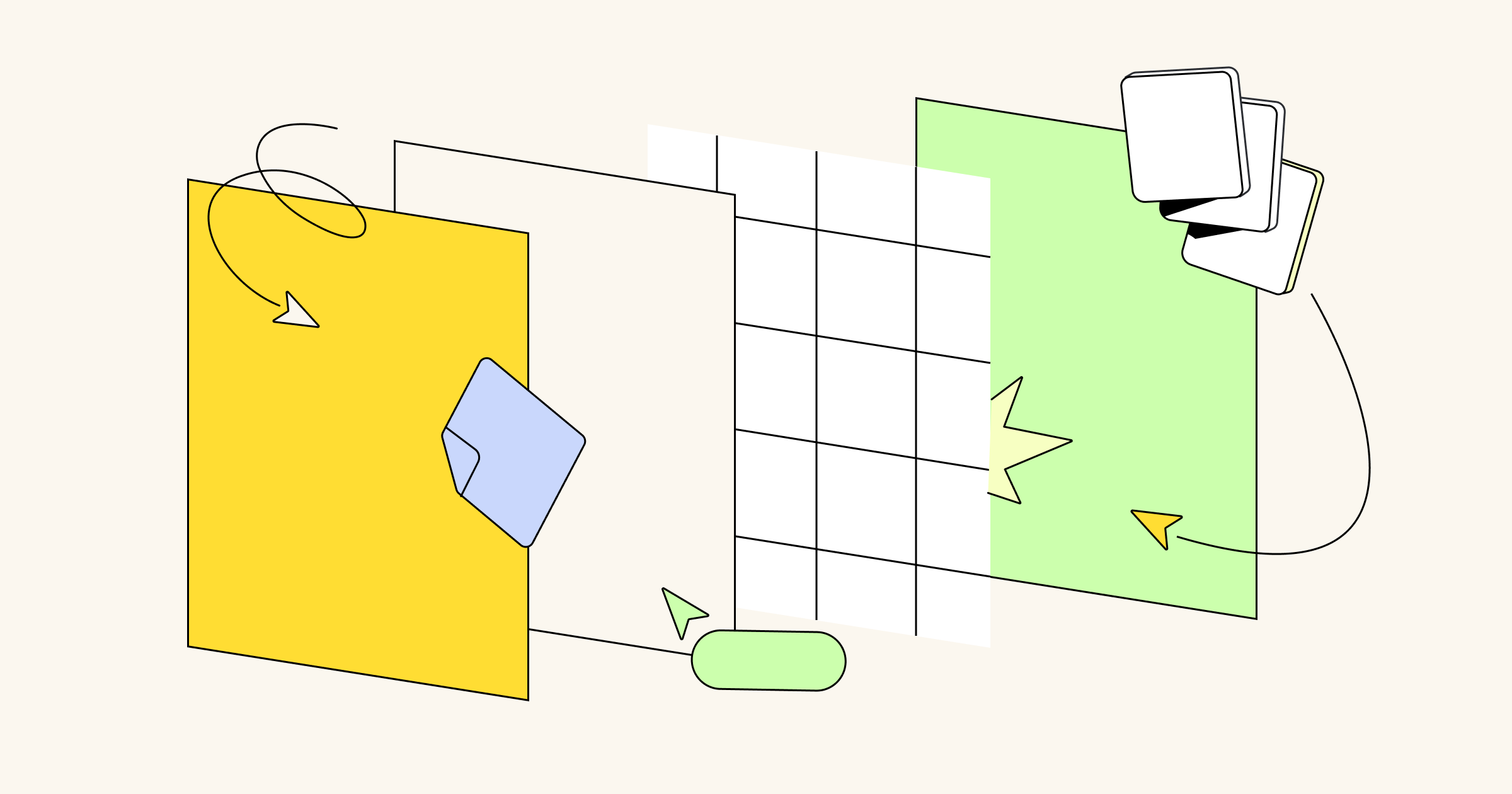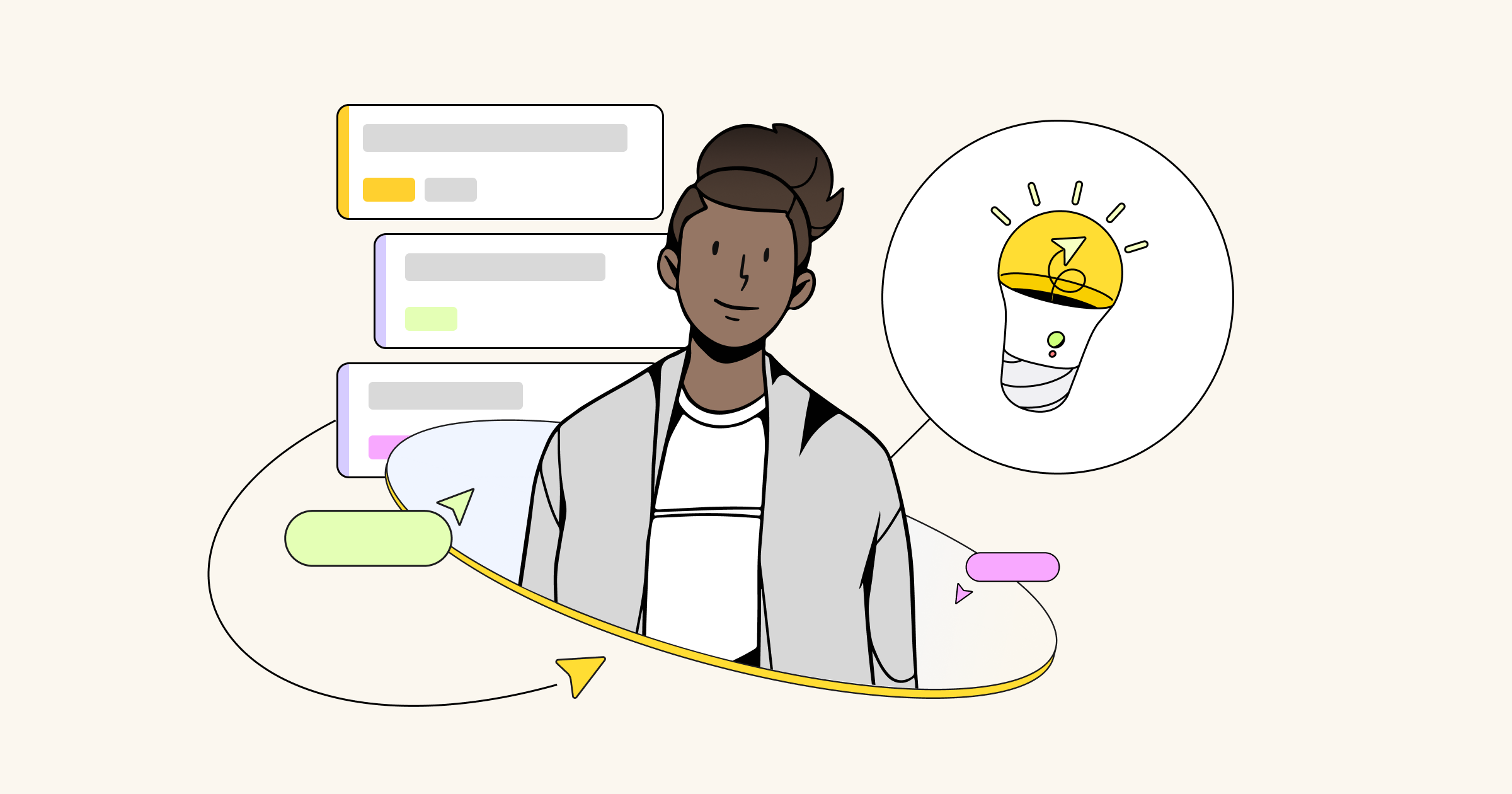Every day in every department of your organization, people are making decisions.
It’s important that all of those decisions are aligned with the same goals — goals that give your business a competitive edge.
But how do you determine your company’s strategy? How can you be sure you’re headed in the right direction?
The answer lies in the strategic management process. The strategic management process guides you through planning, implementing, and maintaining the strategies that lead to the best business performance.
This article introduces the strategic management process and gives you tips on how to do it right.
What is the strategic management process?
Strategic management is the process of defining and implementing an organization’s strategy. It involves analyzing current circumstances, developing a plan to reach important goals, and executing that plan.
All businesses can benefit from strategic management to help them meet long-term objectives. The process is especially important when the organization is going through big changes or facing aggressive competition. For example, a start-up moving into the scale-up phase can implement strategic management to guide growth.
Why is strategic management important?
Strategic management ensures that the actions of everyone in your organization are aligned with your major goals. It helps departments and business leaders make better, faster decisions.
Strategic management keeps departments on the same page.
Instead of every department head making their own choices about what the company needs, a strategic plan provides a framework for prioritizing projects.
It helps your organization find new opportunities and anticipate new challenges.
Strategic management involves an in-depth analysis of your current circumstances, the market, and the competitive landscape. This helps you discover new opportunities for success.
Strategic management allows for more efficient organizational performance.
Having a strategy helps people in your organization make tactical decisions more quickly, and it keeps you from wasting time on projects that don’t align with the company’s mission.
This streamlines your processes and creates greater operational efficiency.
What are the 5 steps of the strategic management process?
Now you know why strategic management is so important, let’s take a look at the 5 essential steps in the strategic management process:
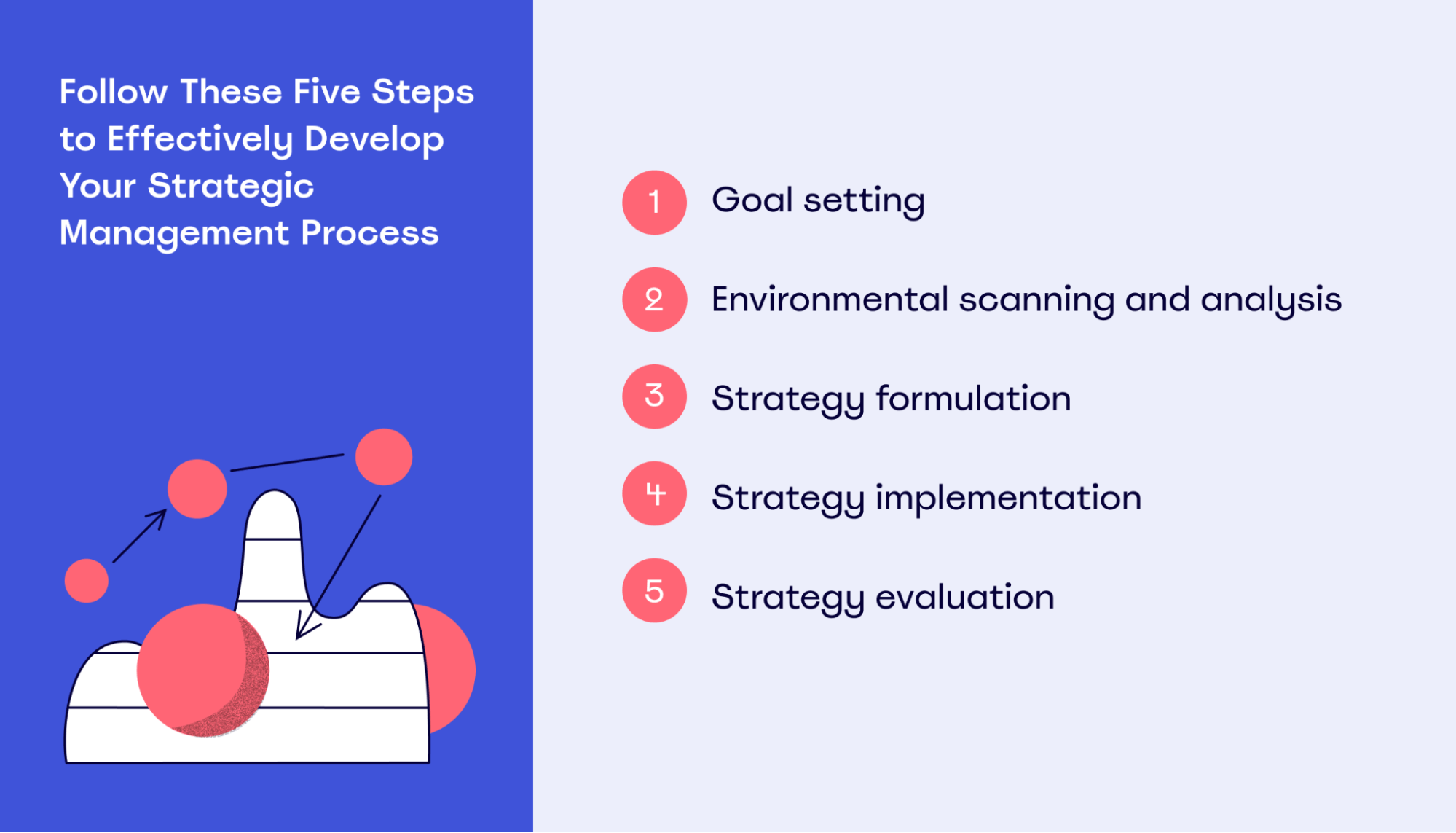
1. Goal setting
The strategic management process is all about creating a roadmap to help you achieve your vision. So before you go any further, you need to clarify what your company wants to achieve.
Many companies kick off the strategic management process by writing a vision statement. A vision statement communicates where you want to be in the future. It’s different from your mission statement — which describes why your company exists — but both statements should inform your strategic plan.
Once you’ve created or reviewed your vision statement, it’s time to pick some broad areas of focus. You don’t need to have specific, measurable goals yet, but you should go into the planning process with an idea of what you want to work on.
For example, growing revenue or improving customer service could be goals at this point.

2. Environmental scanning and analysis
The next part of the process is analysis. Before you can define strategies and tactics, you need to know where you stand currently. That includes internal factors, like your location, structure, and talent, as well as external factors like your competition and market forces.
The more information you have, the stronger the foundation of your strategic plan. Here are some tips for conducting an analysis.
1. Solicit feedback.
Talk to team leaders to get a better understanding of internal operations. Employee surveys, interviews, and discussion groups can be used to learn about the perspectives of everyone in the company.
2. Learn about your customers.
You can survey your existing customers or email list to learn more about how your customers and prospects feel. For example, if they’re generally frustrated with your customer service team’s response time, then improving that can be a strategic objective. Or maybe you’ll learn about new product features they want, and you can plan to develop them.
3. Research the competitive environment.
Researching your competitors can help you find your weak spots and learn where you stand out from the crowd.
You can use Miro’s competitor analysis template to analyze and evaluate the competitive landscape for products, services, and companies.
4. Consider your resources.
When you’re setting your goals, you’ll have to know if you have the people and resources to accomplish them. Having a clear idea of your resources from the start will help you set realistic objectives.
5. Conduct a SWOT analysis.
SWOT stands for Strengths, Weaknesses, Opportunities, and Threats. You can organize your SWOT analysis visually by using Miro’s SWOT Analysis template.
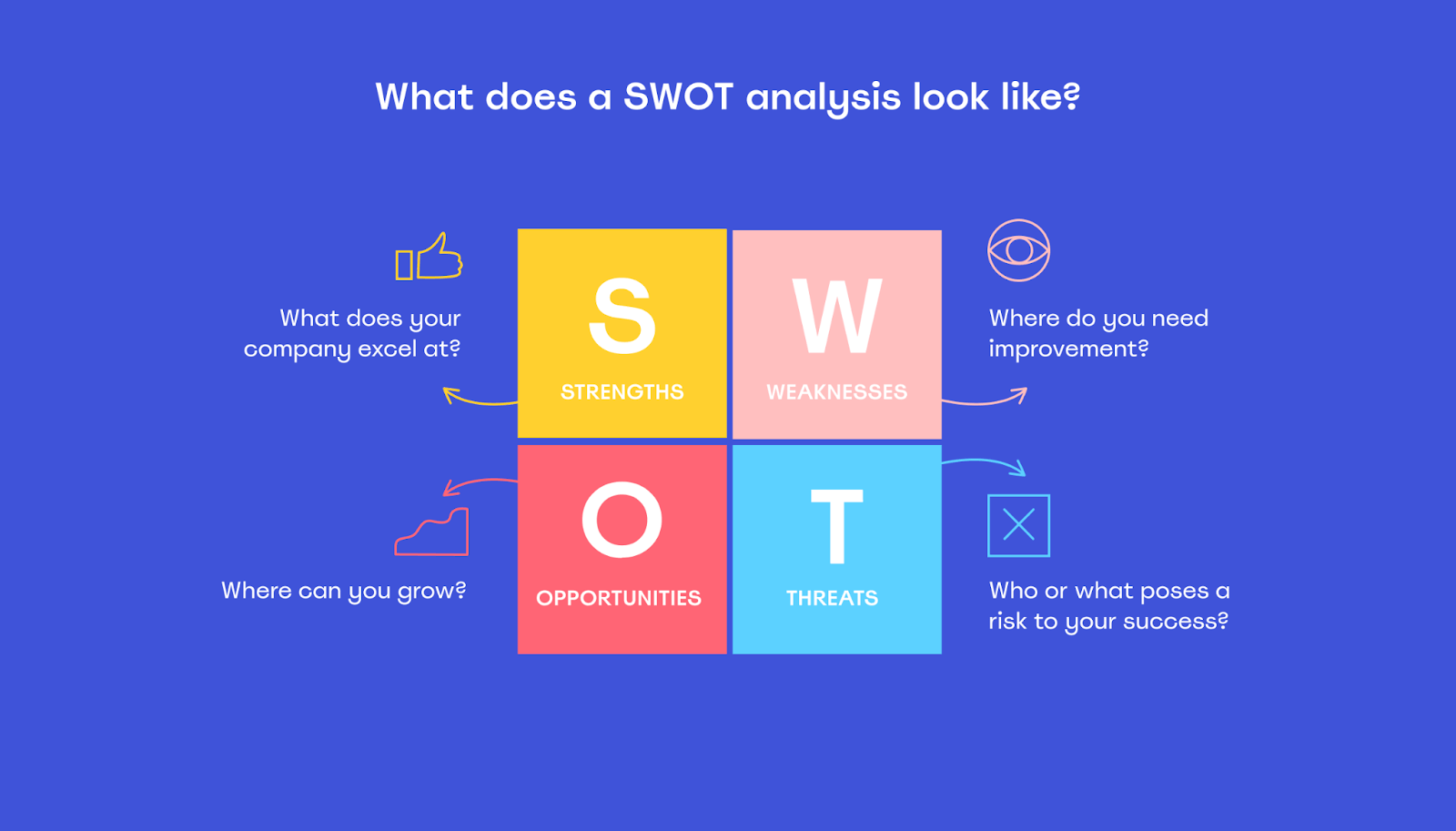
3. Strategy formulation
It’s finally time to write your strategic plan. In addition to your mission and vision statement, a strategic plan has a few key components.
Strategic objectives
Strategic objectives are high-level goals that help you accomplish your mission. Some examples of strategic objectives include:
- Grow earnings per share by 10% per year
- Launch two new products per year
- Increase NPS to 50 by 2024
Tactics
For each strategic objective, use tactics that tell you specific actions to achieve the goal. For example, if your strategic objective is to increase awareness of your brand, a tactic could be to create profiles on the major social media sites.
Metrics
Part of the strategic planning process is determining how you’re going to measure your progress toward your objectives. Choose a metric for each goal and make sure you have the ability to track it.
What about projects?
Your strategic plan doesn’t need to go into the projects that each department will undertake. Projects are related to strategic planning as the vehicle for accomplishing a strategic objective. However, projects can be planned by individual departments once the plan is complete.
For example, if your strategy is to improve customer loyalty and your tactic is to implement a rewards program, the marketing or customer experience teams will be put in charge of managing the creation of the program.
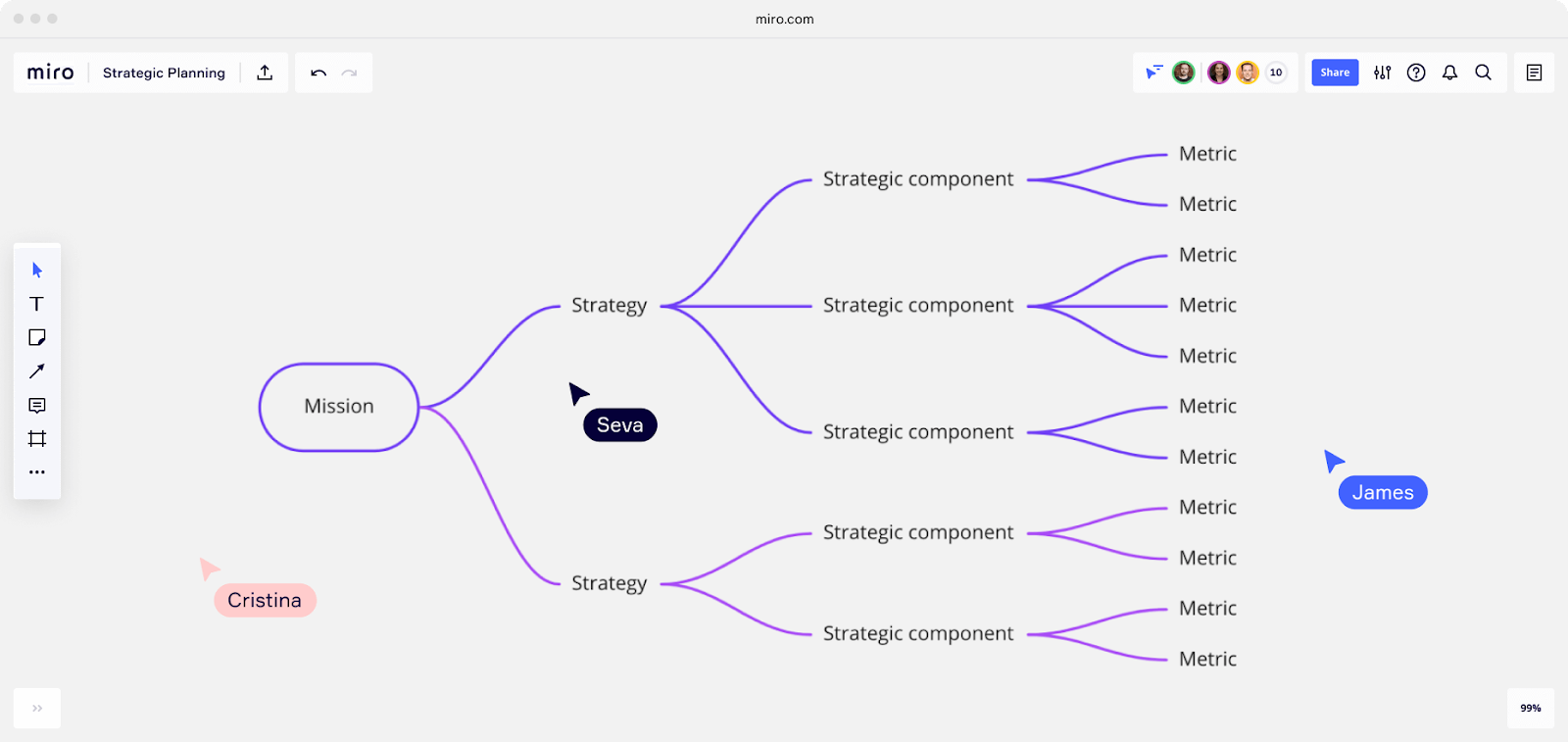
4. Strategy implementation
You’ve determined your organization’s strategy, but the work has just begun. Now you need to make a plan for implementing your strategic objectives.
Secure any resources you need.
Make sure you have the resources, budget, and approvals necessary to execute your plan.
Delegate the work.
Roles should be clearly defined at this point. Who’s in charge of communicating the plan to teams? Who will report on plan progress? Which departments will be responsible for which tactics?
Launch the plan.
Communicate the details of the plan to the company.
Depending on your organization, you may also need a plan to communicate your strategy with the board, key customers, investors, or the public.
Communication is a two-way street. Give people a way to ask questions or submit concerns about the plan.
Offer training.
If business decisions are going to be based on your company strategy, decision-makers need to know what that strategy is.
For people who require a deep understanding of your strategic plan, like department leaders, offer educational sessions to get them up to speed.
Make a plan to share your progress.
The whole company is working toward common goals — make sure you keep everyone updated on how they’re doing. Regular communication about how the strategic plan is going will increase buy-in.
5. Strategy evaluation
Most strategic plans cover the next three to five years. But that doesn’t mean you can’t adjust your strategies along the way.
Part of your implementation plan should be a schedule for continually reviewing your strategic plan, including its relevance to your current circumstances, its practicality, and how much progress you’ve made so far.
If any of your strategic objectives or tactics haven’t been implemented on time, ask yourself:
- Are we still making progress toward this goal?
- Do we have the resources to achieve the goal?
- Can the goal be accomplished if the deadline is extended?
- Is the goal still relevant to our current circumstances?
- Can the goal be changed slightly to accomplish something similar?
Some strategies may need to be removed from the plan or updated.
Strategic management process secrets for success
The strategic management process has many points of possible failure. Some organizations never agree on a plan, while others have great ideas that fall apart in the implementation process.
Following these best practices will give you the best chance of strategic management success.
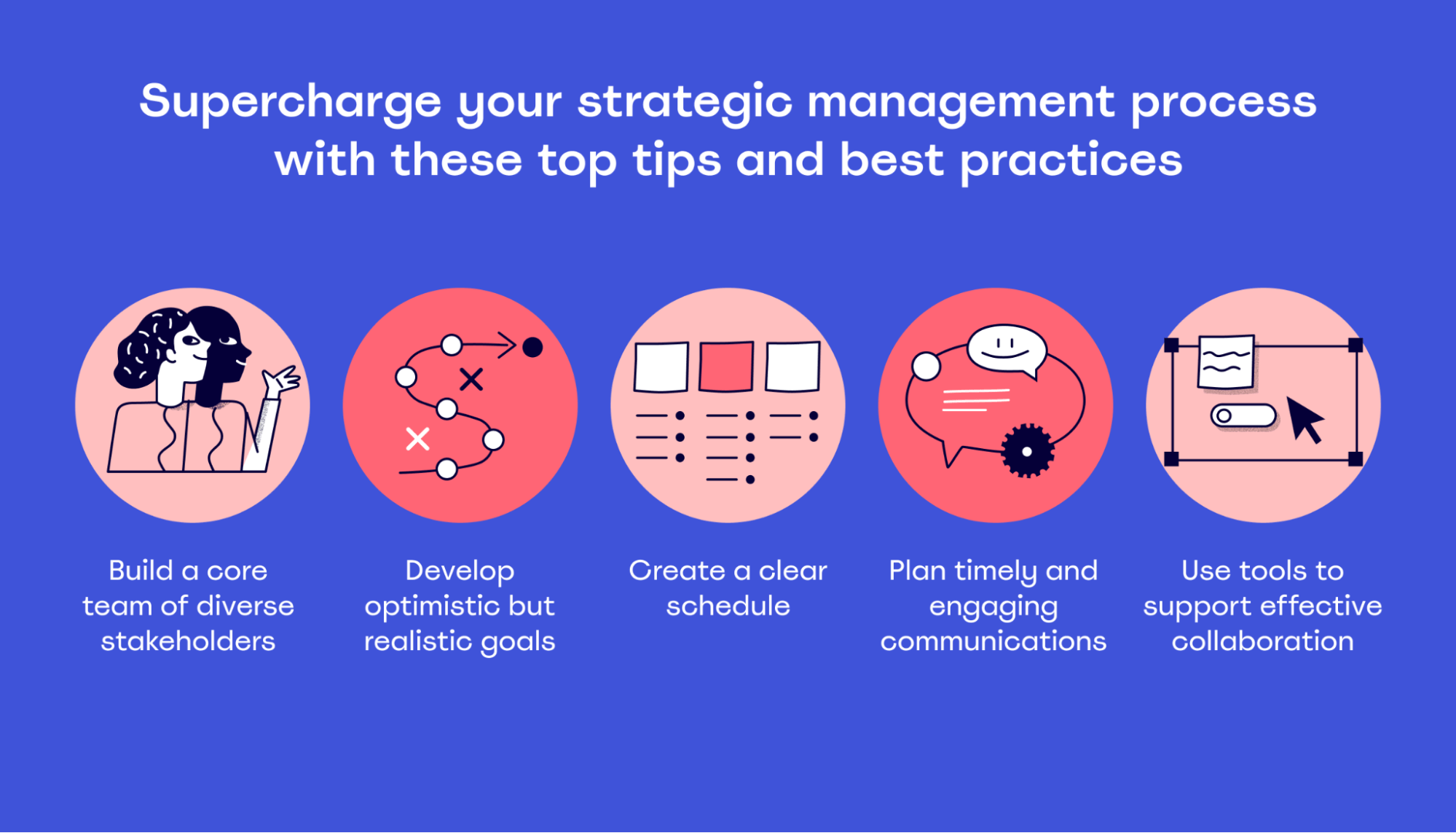
Start with a core team that owns the process.
Brainstorming and collaboration are easiest if you start with a small group of stakeholders. This shouldn’t just be a few executives. Bring in a diverse group of thinkers from around the organization.
These people will help make and implement the plan. Their buy-in will also be important in making sure that every department is enthusiastic about the company’s new direction.
Make your goals optimistic but realistic.
Setting your strategy for the next several years is exciting — you get to decide the direction your company is headed and what you intend to accomplish. It’s okay to be optimistic about your vision.
But don’t get too carried away. If your objectives aren’t realistic, the plan will fall by the wayside quickly.
Agree on due dates.
To make sure your plan is carried out, everything should be on a schedule. That includes your strategic objectives (like “increase revenue 30% by the end of 2023) as well as elements of the strategic management process, such as holding the planning meeting, communicating the plan to your company, and reporting on your progress.
Have a plan for communication.
Part of the strategic planning process is letting everyone in the company know about the plan — and inspiring them to be enthusiastic about it.
Consider having a company-wide strategic plan kickoff event. When you introduce the plan, you can also let employees know about any rewards that will be given to teams or individuals that exceed the plan’s goals.
Use tools that make collaboration easy.
The strategic management process involves the entire organization, so collaboration is key. But group work can be disorganized and unproductive if you don’t have methods to stay on track and share ideas.
The right tools can help you keep planning sessions organized, share ideas, make collaborative decisions, and convey your ideas to others.
Miro’s visual workspace is a full-featured digital space that makes it easy to plan, share, discuss, and review information in real-time. Try brainstorming ideas, add comments and questions using sticky notes, and vote on potential courses of action using our plugin.


Conclusion
The strategic management process sets the long-term direction for your organization, so it’s important to get it right. That means bringing teams together to share ideas and work toward a common goal.
Miro can aid and enhance collaboration on your strategic management process. Get started with one of the fully-customizable templates from our strategic planning suite. Try it for free.





